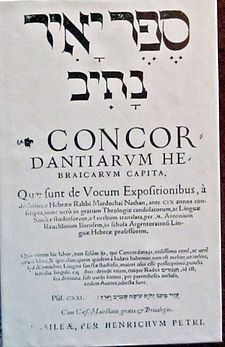- Concordance (publishing)
-
A concordance is an alphabetical list of the principal words used in a book or body of work, with their immediate contexts. Because of the time and difficulty and expense involved in creating a concordance in the pre-computer era, only works of special importance, such as the Vedas,[1] Bible, Qur'an or the works of Shakespeare, had concordances prepared for them.
Even with the use of computers, producing a concordance (whether on paper or in a computer) may require much manual work, because they often include additional material, including commentary on, or definitions of, the indexed words, and topical cross-indexing that is not yet possible with computer-generated and computerized concordances.
However, when the text of a work is on a computer, a search function can carry out the basic task of a concordance, and is in some respects even more versatile than one on paper.
A bilingual concordance is a concordance based on aligned parallel text.
A topical concordance is a list of subjects that a book (usually The Bible) covers, with the immediate context of the coverage of those subjects. Unlike a traditional concordance, the indexed word does not have to appear in the verse. The most well known topical concordance is Nave's Topical Bible.
The first concordance, to the Vulgate Bible, was compiled by Hugh of St Cher (d.1262), who employed 500 monks to assist him. In 1448 Rabbi Mordecai Nathan completed a concordance to the Hebrew Bible. It took him ten years. 1599 saw a concordance to the Greek New Testament published by Henry Stephens and the Septuagint was done a couple of years later by Conrad Kircher in 1602. The first concordance to the English bible was published in 1550 by Mr Marbeck, according to Cruden it did not employ the verse numbers devised by Robert Stephens in 1545 but "the pretty large concordance" of Mr Cotton did. Then followed Cruden's Concordance and Strong's Concordance.
Contents
Use in linguistics
Concordances are frequently used in linguistics, when studying a text. For example:
- comparing different usages of the same word
- analysing keywords
- analysing word frequencies
- finding and analysing phrases and idioms
- finding translations of subsentential elements, e.g. terminology, in bitexts and translation memories
- creating indexes and word lists (also useful for publishing)
Concordancing techniques are widely used in national corpora such as American National Corpus, British National Corpus, and Corpus of Contemporary American English available on-line. Stand-alone applications that employ concordancing techniques are known as concordancers [2]. Some of them have integrated part-of-speech taggers and enable the user to create his/her own pos-annotated corpora to conduct various type of searches adopted in corpus linguistics. [3]
Inverting a concordance
A famous use of a concordance involved the reconstruction of the text of some of the Dead Sea Scrolls from a concordance.
Access to some of the scrolls was governed by a "secrecy rule" that allowed only the original International Team or their designates to view the original materials. After the death of Roland de Vaux in 1971, his successors repeatedly refused to even allow the publication of photographs to other scholars. This restriction was circumvented by Martin Abegg in 1991, who used a computer to "invert" a concordance of the missing documents made in the 1950s which had come into the hands of scholars outside of the International Team, to obtain an approximate reconstruction of the original text of 17 of the documents.[4][5] This was soon followed by the release of the original text of the scrolls.
See also
- Back-of-the-book index
- A Vedic Word Concordance
- Bible concordance
- Bitext
- Concordancer
- Cross-reference
- Index
- KWIC
References
- ^ Bloomfield, Maurice (1990). A Vedic Concordance. Motilal Banarsidass Publ. ISBN 8120806549.
- ^ Introduction to WordSmith
- ^ Linguistic Toolbox
- ^ Hawrysch, George (2002-08-04). "Dr. George Hawrysch's speech on concordance book launch". The Ukrainian Weekly, No. 31, Vol. LXX. Ukrainian National Association. http://www.ukrweekly.com/old/archive/2002/310217.shtml. Retrieved 2008-06-19.
- ^ Jillette, Penn. "You May Already be a "Computer Expert"". http://pennandteller.com/sincity/penn-n-teller/pcc/deadsea.html. Retrieved 2008-06-14.
External links
- Shakespeare concordance - A concordance of Shakespeare's complete works (from Open Source Shakespeare)
- Alex Catalogue of Electronic Texts - The Alex Catalogue is a collection of public domain electronic texts from American and English literature as well as Western philosophy. Each of the 14,000 items in the Catalogue are available as full-text but they are also complete with a concordance. Consequently, you are able to count the number of times a particular word is used in a text or list the most common (10, 25, 50, etc.) words.
- Hyper-Concordance - The Hyper-Concordance is written in C++, a program that scans and displays lines based on a command entered by the user. The main advantage of the C++ program is that it not only identifies the concordance lines but the words occurring to the left and the right of the word or phrase searched. It also reports the total number of text lines, the total word count and the number of occurrences of the word or phrase searched. The full text of the book is displayed in a box at the bottom of the screen. Each line of the text is numbered, and the line number and the term(s) searched provide a link to the full text.
- Concord - Page includes link to Concord, an on-the-fly KWIC concordance generator. Works with at least some non-Latin scripts (modern Greek, for instance). Multiple choices for sorting results; multi-platform; Open Source.
- ConcorDance - A concordance interface to the WorldWideWeb, it uses Google's or Yahoo's search engine to find concordances and can be used directly from the browser.
- Chinese Text Project Concordance Tool - Concordance lookup and discussion of the continued importance of printed concordances in Sinology - Chinese Text Project
Categories:- Concordances
- Indexing
- Searching
- Library science
- Information science
- Reference works
Wikimedia Foundation. 2010.

